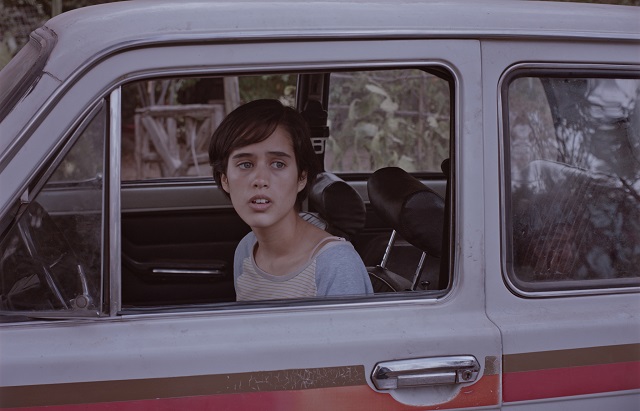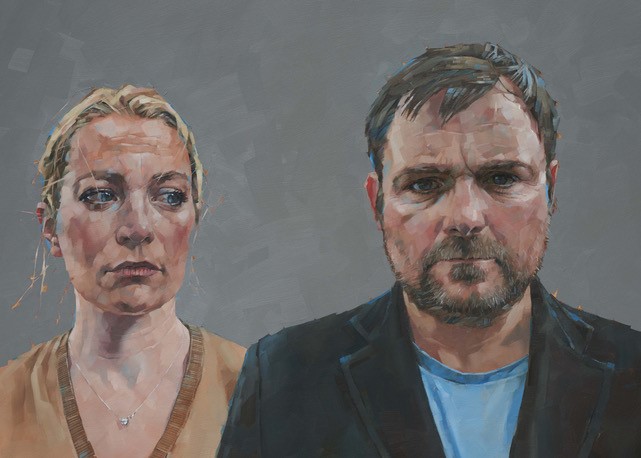
The theme of New Year’s Eve celebrations is instrumental in two of this year’s official competition films. Diametrically opposed in tone, location and intention, they both explore the dramatic possibilities the traditional annual gatherings offer. The first one is Chilean filmmaker Dominga Sotomayor’s evocative coming of age memoir, Too Late To Die Young, in the midst of the summer holidays as it is set in the southern hemisphere. The second, Happy New Year, Colin Burstead, is a BBC commission to be aired as one of the specials in the channels’ festive programming. It gives Ben Wheatley a new chance to flaunt his corrosive sense of humour by putting together a dramedy about a rather traumatic extended family’s gathering.
TOO LATE TO DIE YOUNG (Dominga Sotomayor)
Inspired by the commune in the mountains outside Santiago de Chile where she was raised, Dominga Sotomayor’s impressive third feature begins with one of the parents taking kids to their last day of school before the Christmas holidays. Right at this moment the family dog’s run away after the car and disappears, shaping up a metaphor about letting go of both our ideas of ownership and emotional baggage that would be rounded in the film’s conclusion and sets its tone mixing confusion and excitement. Confusion because it deals with the blurry human stage of adolescence. A time in which we abandon the safe simplification of the world our families have created for us as children and begin to discover it for what it actually is, often leading to a perplexing stage that we hardly ever leave afterwards. Excitement because it perfectly captures in intimate detail the everyday fun and games typical of a kids’ summer holiday; their bike rides, tree houses, nature excursions, first romances, first disappointments…with an almost Rohmer-esque ability to create an impressionistic collage through observations of very personal, seemingly mundane, intimate details that slowly but assuredly describe the situations of the characters whose lives we are introduced to.
This communal setting, in which the families who created it built their own houses hoping for a more organic way of living away from the perils of a big city, creates a dream-like, almost idyllic landscape for the director to explore the relationships of the many characters that populate it. It takes place in 1990, the year when Chile left behind decades of General Pinochet’s dictatorial rule and became a young democracy and its core coming of age tale applies as much to the country as to the main teen protagonist, Sofía, at the time when she discovers her feminine attractive, loses interest for her same age boyfriend Lucas and becomes infatuated with an older guy.
As we are casually being introduced to the characters in the first part, mostly focused in the world of the kids in the commune; adults are preparing for the festive celebrations. And New Year’s Eve arrives in between karaoke songs; drinking and partying. The traditional countdown to welcome it marks a change of tone in the film. For Sofía, It’s the moment of transit between childhood and adulthood. Sofía had invited her mother, whom time ago left the commune, to the party hoping she would go and live with her in the city. But as she never turns up, frustration prompts her rebellion against her father; the further seduction of her older crush, Ignacio; and the definitive break up with her younger boyfriend, Lucas.
During the morning after’s hangover a fire breaks, quickly spreading through the dry vegetation. The burning marks another cathartic moment in which relatives search for their loved ones among the smoke and impending sense of danger. This is long, intense moment of closure, when some of the tensions between them find some kind of vague resolution. The families that had leave the city to build an alternative life away from urban hazards are confronted by nature’s own ones. A realization that, ultimately, life is unpredictable and you have to deal with what it brings as it comes.
The mix of non professional actors (most of the children) and well-established stars (you may recognize Antonia Zegers and Alejandro Goic from Pablo Larraín’s films) adds to the film’s gentle vitality and dynamism. DP Inti Briones’s remarkable cinematography manages to capture everyday naturalism and intimacy with unusual ease, framing it in gorgeous ways that make the most to its natural locations’ lush beauty. In just three features Dominga Sotomayor has established herself as one of the most unique voices of Latin American cinema and ‘Too Late To Die Young’ should help fast-tracking her to the “first league” of world auteurs. ★★★★½

HAPPY BIRTHDAY, COLIN BURSTEAD (Ben Wheatley)
From one of the most unique new voices in Latin America to one of the most irreverent ones in British cinema; Ben Wheatley has cemented his reputation mostly through genre movies, particularly blending horror with a very personal, socially aware, sense of humour. Happy New Year, Colin Burstead covers very familiar ground. The festive family gathering has traditionally been a classic inspiration for both comedy and drama. The filmmaker blends the two in this dramedy that aims to capture the sheer terror of those experiences when they go terribly wrong.
Selected for the festival’s official competition, where Wheatley also produces another of the films, Peter Strickland’s mind-blowing ‘In Fabric;’ his usual lead actor, Neil Maskell, heads a brilliantly diverse, starry cast of British favourites which features I Daniel Blake’s Hayley Squires; Charles Dance; Sam Riley, among many others.
This accident-ridden New Year’s celebration is set in a countryside stately home, where Colin has invited his big family for the occasion. Like in most families, the relationships between its members are crammed with tensions; unresolved emotional disputes; ongoing misunderstandings; broken partnerships and new ones; all dealt with a very British sense of resignation in the wake of what in this case it’s perceived as an obligation that one must endure annually as a duty to their loved ones.
Wheatley’s incisive sense of irony finds much to make fun at in this multicultural and diverse family environment that wants to represent today’s British society in full. Though well observed, the characters are mostly well-known types, from the family’s black sheep son to the demanding mother, delving in the embarrassment caused by those postponed but unavoidable reencounters. But, as a BBC commission for this year’s special Christmas season programming, Wheatley had perhaps to restrict his sarcasm and ultimately let the tensions and traumas give way to forgiveness and redemption. The loving family ties (mostly) prevail over the turmoil, leading to the customary happy ending. This is perhaps why this feels like a minor work for him, albeit one which still offers plenty to enjoy. ★★★½